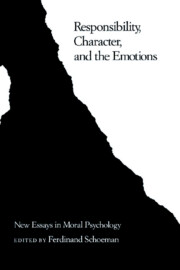Book contents
- Frontmatter
- Contents
- List of Contributors
- Acknowledgments
- 1 Introduction
- Part I Responsibility and Character
- Part II Responsibility and Culpability
- 8 The Moral Worth of Retribution
- 9 Nonmoral Guilt
- 10 Provocation and Culpability
- 11 Responsibility and the Limits of Evil: Variations on a Strawsonian Theme
- 12 Statistical Norms and Moral Attributions
- 13 Guilt, Punishment, and Desert
- 14 Intention, Foreseeability, and Responsibility
- Index of Names
13 - Guilt, Punishment, and Desert
Published online by Cambridge University Press: 03 February 2010
- Frontmatter
- Contents
- List of Contributors
- Acknowledgments
- 1 Introduction
- Part I Responsibility and Character
- Part II Responsibility and Culpability
- 8 The Moral Worth of Retribution
- 9 Nonmoral Guilt
- 10 Provocation and Culpability
- 11 Responsibility and the Limits of Evil: Variations on a Strawsonian Theme
- 12 Statistical Norms and Moral Attributions
- 13 Guilt, Punishment, and Desert
- 14 Intention, Foreseeability, and Responsibility
- Index of Names
Summary
That the culpable offender deserves to suffer the pain of legal punishment is an intuition shared by most; what is not shared is its justificatory basis. Utilitarians, appealing to the fact that in every other instance the deliberate infliction of suffering is wrong, except where necessary to promote a greater good, object to retributive justifications on the grounds that they are nothing more than veiled rationalizations for revenge. They argue that the justification of punishment must involve an appeal to its beneficial consequences. Though attractive, philosophers have come to see utilitarianism as inadequate. Not only does it fail to capture the intuition that the guilty deserve punishment, but without making reference to right relevant properties of persons, it appears to violate the Kantian injunction that persons are never to be treated as merely a means to the well-being of others. Most writers on punishment have noticed this. However, unwilling to abandon the utilitarian intuition that the moral justification of punishment must include the promotion of a socially worthwhile end, they have endeavored to justify punishment by qualifying the utilitarian account with considerations of desert. Initially this was argued for on the conceptual ground that the restriction of punishment to the deserving is part of the very definition of punishment. However, it was soon seen that an appeal to definition leaves unanswered the moral question which initially generated the problem – why, on utilitarian grounds, is it morally permissible to punish the culpable offender? Following H. L. A. Hart, philosophers responded to this with the suggestion that any morally tolerable account of punishment must see it as a compromise between conflicting moral principles.
- Type
- Chapter
- Information
- Responsibility, Character, and the EmotionsNew Essays in Moral Psychology, pp. 316 - 337Publisher: Cambridge University PressPrint publication year: 1988
- 1
- Cited by



